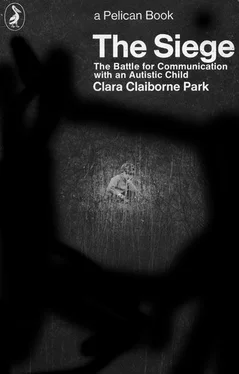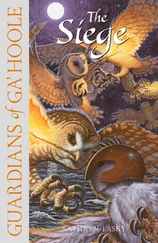Elly has learned to do most of the things she did not do when she was four. She turns knobs, she opens windows, she puts her zipper together and zips it, she unbuttons buttons if there are not too many, she will button one. She goes downstairs foot over foot as normal children do. She jumps down one step — she was seven before she became willing to do that — and recently she has jumped two. Carefully she climbs alone up snow banks and fences, if the person who is with her stays out of reach of her searching hand. She dresses herself in a finite time, if her clothes are laid out for her and she is constantly spurred on to take the next step. She toilets herself, not on impulse, but by a self-established routine night and morning. This month she took the brush and brushed her hair. Occasionally she has even come out with the proud, impatient ‘Elly do’ so familiar to mothers of normal three-year-olds, as she mails a letter or pushes open a heavy door.
But she is eight years old. She does not ride a tricycle. Unless encouraged to do so, she does not pull a wagon, and she does not manage a sled. She will not climb a ladder or go down a slide, though she did both at three and though this summer she climbed without protest down a twenty-foot ladder into a boat in order to go sailing. She cannot snap a snap or operate a safety pin or untie a knot or tie her shoes. She still takes your hand to effect what she wants. It is no longer a denial of you as a human being; she may be in close contact with you, talking and laughing. She may — she probably will — respond to a good-humoured ‘You do it, Elly.’ But it is six and a half years now and still she tries to avoid action on her own.
Her manual dexterity, once so remarkable, appears so no longer. She has not increased it over the past four years and normal children have caught up with and surpassed her. Her letters were good at age five; they are as good today, no better. They are clearly good enough for her; she puts them down, fast and casual, and makes no further effort. At school, if her work is good, she gets a star. At first that delighted her, but now she is equally pleased with a zero or an 80. It is not that she doesn’t know the difference; she does. But any notation pleases her, and the star is no longer novel enough to motivate sustained effort. In fact, Elly will sustain effort only within the framework of a stereotyped task, and even there she does so only f aute de mieux . She herself will type out the numbers from one to fifty, but she would much rather have me do it.
Elly types easily now, but two years ago she was as weak with the typewriter as she had been at three with faucets and switches. At first she used my fingers, then I used hers. It was weeks before she would press a key hard enough to make a mark of her own. The process repeats itself with each new skill. Certainly I can teach her to tie her shoes if I try hard enough. Perhaps this year I will do it, or perhaps her teacher will, as Elly in the service of weakness mobilizes the vanished blindness and deafness, ignoring instructions, averting her eyes from the task, even closing them. We can teach her one new skill, or five, or ten; we can insist, ignore her protests; we can batter down her resistance. But there are hundreds of such skills inherent in the condition of a normal eight-year-old, and how much expense of spirit can we — or she — afford?
It is of course impossible to separate this physical inertia from the mental and emotional inertia which accompany it. Again, it is characteristic of the condition, not unique to Elly. Rosalind Oppenheim [35] Author of ‘They Said Our Child Was Hopeless’; in an unpublished letter to Dr Bernard Rimland.
describes her son’s inability to sustain any activity-this of a child who at four endlessly rolled a ball across the floor but who at six, still speechless, could read and answer questions in writing. Unlike Elly, he read stories, if mother or teacher shepherded him through page by page, asking questions at the end of each. He enjoyed the stories too, but though the book was left temptingly available week after week he never once picked it up on his own. And so it is with Elly. Whatever she does, no matter how well it begins, peters out. There is no forward motion, no self-sustained expansion of mastery — in play, in self-help, in drawing, in reading, even in the numbers she finds so fascinating — except in completion of a routine, or sustained by someone else with a support that is in constant danger of becoming a substitute for her own activity or — if it lures her into activity that is too successful — of causing her to abandon it altogether.
Of how many remarkable feats, experienced with how much hope, have I had to record that ‘She did this only once’, or ‘twice in six months’, or ‘no longer shows interest’? Her liking for letters and her memory for their combinations is still remarkable. Another child who possessed the ability to memorize a new word overnight would have been reading within a month. Elly reads voluntarily not at all — unless we count the OFF-ON on switches or the NOPARKING signs whose non significance she embraces with delight, perhaps because it does not threaten her with further progress. Elly can understand spelling too, or so I infer from the fact that for days she has been writing VAKE and GAKE and correctly pronouncing them. But when I suggested she add TAKE and LAKE she said ‘No?’ I knew better than to insist, but she avoids them as if I had drilled her in them daily.
Even in the area of learning where she is more at home, inertia holds her back. It would be possible, by proper selection, to make Elly appear extremely precocious mathematically. When I was still diffidently showing her that 1 + 1 = 2, she assembled two six-inch blocks and a seven-inch one from her set and remarked, without counting them, that 6 + 6 + 7 = 19. Yet today in school, six months later, she makes all the usual mistakes in performing far simpler three-digit sums. This summer, when someone said we needed thirty hamburgers for a picnic, Elly, who had seemingly been paying no attention, volunteered that 15 + 15 = 30. When she was given a box of 48 crayons to add to her set of 64, she knew by some process of her own that she had 112, although she had not yet learned to perform addition that involves carrying. Watching such isolated feats, it is hard not to speculate on what she could do if she would. Yet they remain isolated, and if one tries to elaborate on them Elly resists. Inertia and passivity take new forms but they do not disappear. They ensure that Elly remains a very imperfect idiot savant .
To sum up: what seems impaired is not only the capacity for affect, but another capacity perhaps even more fundamental, the capacity for undertaking exploratory behaviour and sustaining it. We know little about what we still call by its old-fashioned name of curiosity, still less about the qualities we describe, with more sophistication, as ‘motivation’ or ‘drive’. All of us know, however, that normal individuals vary enormously in the degree to which they possess these qualities. We know that curiosity, motivation, and drive are affected by the stresses of the environment, but we know also that even babies differ markedly in their desire to explore the world around them, for no apparent environmental reason. There are those from whom no medicine bottle is safe, who pull every light cord, who poke into every drawer to see if something interesting might be hiding there, and others (like my three normal children) who are much less interested in physical exploration. And there is Elly, who is not interested in exploration at all.
Families can reinforce curiosity and drive in their children, or discourage them. Societies can do the same; we all know that three thousand years of Egyptian intelligence is a very different thing from three hundred years of Greek. But however it is reinforced or discouraged, all normal human beings exhibit the drive to learn and to explore — indeed all animals do, our cousins the apes most of all. Years ago W. I. Thomas listed ‘a desire for new experience and stimulation as one of the instincts’, [36] Cited by Rimland, Infantile Autism, p. 209, in a discussion that readers who are interested in this possibility will find extremely rewarding.
and indeed it must be so. What if it were not? If animals were born without that positive enjoyment of new experience which leads them to explore and master their environment, neither they nor their species would survive. Curiosity and drive are essential to evolutionary survival, and if we can expect any characteristics to be built into animal biology it would be these. One day we may know how such things are built in — into brain impulses, into nerve structure, into blood chemistry, into mechanisms we cannot yet suspect. Even now we — not neurophysiologists only, but all of us — know how will and motivation can be reduced, even temporarily annihilated, by physical causes such as ageing, sleeplessness, or drugs. Most of us feel such a reduction as unpleasant, but it need not be. Suppose a child felt always the detachment that in certain people is produced by LSD? Such a child would not initiate action, would welcome the limits that made it unnecessary, would, as its irreversible growth engaged it inevitably with the world’s complexity, seek out and enjoy the unchanging patterns that affirm stability in a world of Becoming.
Читать дальше












